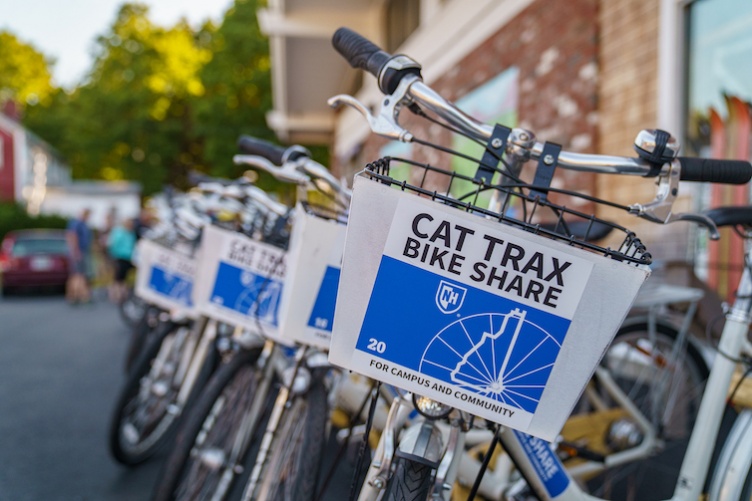
“Ding! Ding!” The bright chiming of a bicycle bell never sounded so cheerful to Steve Pesci, special projects director for UNH Facilities.
Over 20 years, Pesci has worked with groups that dreamed of bringing a bicycle-sharing program to the Durham campus, only to see them stymied by the lack of technology that could make sharing easy to access.
But under bluebird skies on a recent August morning, he joined with UNH President Jim Dean and 30 staff, students, faculty and Durham residents who finally put UNH’s first bicycle-sharing program on the road.
Led by two Durham police officers on bicycles, the group pedaled from Oyster River Cycle and Sport on Dover Road, where owner Brian Keegan ’05 and his crew had tuned up the bikes, to racks at the Peter T. Paul College of Business and Economics. Beginning this fall as a pilot project, the UNH Cat Trax Bike Share program will officially roll out in the spring, when anyone on campus and in the Durham community will be able to reserve a bicycle through Movatic, an easy-to-use app that is expected to launch soon and will be tailored to Cat Trax. Bikes will be docked at public bike racks across the UNH campus and Durham; users can locate the nearest one to them by signing on to the app. The program will run during warmer months, and close during winter.
“It’s been a long time coming, and it took a lot of work by partners from across campus and in the Durham community. It was really a great team effort,” Pesci said. “The students and the Sustainability Institute and Transportation Services deserve a lot of credit, because they were so committed to making this happen.”
The program’s mission is to make sustainable transportation more accessible and affordable – and based on the inaugural group ride, fun, too. Better yet, students will be able to ride the first hour for free.
“I’m a cyclist, so I wanted to come out here to support Oyster River Cycle and Sport and also to support UNH’s commitment to sustainability as an important, strategic goal for the entire university community,” said Dean, who joined the group ride. “Something like this helps bring great awareness to the things that we all can do to promote sustainability in our everyday lives.”

President Jim Dean leads a group of riders on the way to campus to kick off the cat trax Bike share program.
The 30 cruiser bikes are built for comfort: upright and stable, with easy-to-use shifters built into the handlebar grips and a basket up front – ideal for getting across campus or picking up groceries. Bluetooth technology inside each bike unlocks it for users, and a geo-locator restricts riders from venturing too far beyond campus and downtown Durham. Go farther, and a signal will indicate to program managers that the bike is “stolen.”
UNH students began building support for the concept four years ago with campus listening sessions and resolutions, and in 2021 they teamed up with the UNH Sustainability Institute, Office of Stewardship and Campus Planning to conduct a survey across campus and in the Durham community. More than 200 responses showed widespread support. UNH’s Transportation Policy Committee endorsed it soon after, along with the undergraduate and graduate student governing bodies. Keegan signed on as a key partner and was a driving force in bringing the bikes to his downtown shop.
Fiona Wilson, UNH’s deputy chief sustainability officer and director of the Sustainability Institute, noted that UNH has worked for decades to reduce its greenhouse gas emissions, cutting its carbon footprint by more than half. Last year, the university updated its climate action plan to go even further. UNH is ranked among the top five most sustainable universities in the U.S. She noted that the town of Durham is also a climate leader that works closely with UNH to promote sustainability throughout the community.
“Cat Trax is aligned with both these town and campus efforts, and it’s a great way to empower community members to be climate leaders and champions,” said Wilson, who is leading the institute’s 25th anniversary celebration this fall.
One recent study showed that global carbon emissions would drop dramatically if everyone rode bicycles instead of cars for about 1.6 miles a day, about as much as people do in the Netherlands. The total reduction would be more than the entire carbon footprint of most countries, including the United Kingdom and Canada.
Cat Trax is a collaboration of UNH's Sustainability Institute, Campus Services and Transportation Services, along with Durham's Oyster River Cycle and Sport. Startup costs for the first year are from one-time support from the Sustainability Institute and Student Activity Fund Committee. Ongoing maintenance and administration costs will come from the existing student transportation fee, roughly $1.75 per student.
-
Written By:
Jim Graham | Communications and Public Affairs | jim.graham@unh.edu | 603-397-9654
















































